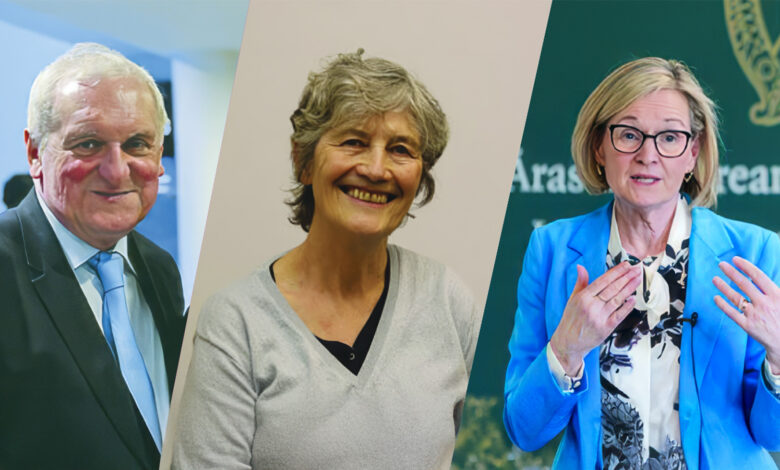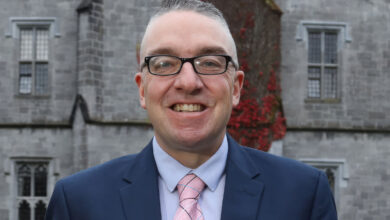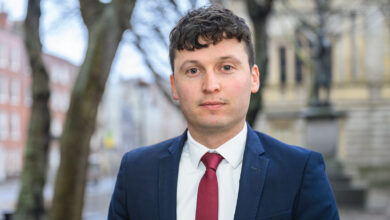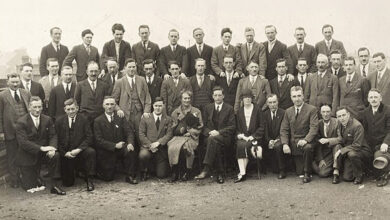Presidential election 2025: Runners and riders

In November 2025, Ireland will have a new President as the nation prepares for the end of the Michael D Higgins era. eolas Magazine looks ahead to the election.
As of April 2025, President Higgins holds an approval rating of 64 per cent among the general public, significantly higher than the leaders of any of the political parties on this island.
For the first time since 2011, all the major parties are expected to contest the election, with Fine Gael and Fianna Fáil having both confirmed that their parties will run candidates in the election, while Sinn Féin will contest the election either on a cross-party basis or in its own right.
Although all the major parties will be cautious about this election (Sinn Féin and Fine Gael were both embarrassed in the last one they, and Fianna Fáil was so unpopular in 2011 that it refused to take part), they will all be keen to put forward a party figure who can aim to match President Higgins’ popularity.
Fianna Fáil
Contesting the presidential election for the first time since Mary McAleese was returned to office in 2004, there is no clear frontrunner for the Fianna Fáil nomination.
Former Taoiseach and party leader Bertie Ahern has been teasing a run for the last three years and re-joined the party in 2023. However, Ahern brings significant baggage related to findings from the the Mahon Tribunal and his role in the financial crisis. In addition, having been out of politics for 18 years, Ahern is an unfamiliar figure for a significant section of the electorate as anyone born on or after 1990 will not have been of voting age by the time he left office.
In April 2025, Mary Hanafin, the party’s former deputy leader, remarked that she would be “open to” running for president “if Fianna Fáil wanted to have that conversation”. Like Ahern, however, Hanafin has been out of frontline politics for a long time, having lost her Dáil seat in 2011 before unsuccessfully attempting to get back into the Dáil in both 2016 and 2020.
Fine Gael
Fine Gael has been in government for the last 14 years and has had seven taoisigh since being founded in its current form in 1933. However, in nearly a century of existence, the party has never won the presidency. Indeed, even at the height of its popularity in 2011, the party’s candidate, Gay Mitchell, polled a derisory 6.4 per cent of the popular vote.
Mairead McGuinness, the former European Commissioner and former Vice President of the European Parliament, is the favourite to win the Fine Gael nomination, and holds a narrow lead in the polls among prospective candidates.
While McGuinness has experience in statecraft, her ability to connect with the public is questionable and it is difficult to see what sets her apart from other prospective candidates in this election.
‘Left unity’
One possibility is a ‘left unity’ candidate, with Sinn Féin seeking to continue its unprecedented co-operation with the Labour Party and the Social Democrats. However, the initial favourite to receive backing from this prospective left coalition, Senator Frances Black, has said that she is “98 per cent certain” that she will not run for president.
Labour leader Ivana Bacik TD has stated that, for a candidate to be nominated on a cross-party basis, they would likely need to be an independent. In this context, the only other viable ‘left unity’ candidate is Galway TD Catherine Connolly, who has refused to rule out contesting the election.
Sinn Féin
In the event that it is unable to agree on a candidate with the other parties of the left, speculation has mounted that Sinn Féin could seek to nominate John Finucane, the Westminster MP for North Belfast, or approach Jarlath Burns, the President of the GAA.
However, on 9 June 2025, Burns ruled out seeking office, saying: “I have another year of the GAA presidency to do and I certainly would not be in the mood to give that up to go for anything else.”
Although Gerry Adams is riding high, having secured compensation of €100,000 from the BBC following defamation proceedings, the 77-year-old former Sinn Féin President, according to his party leader, is “not remotely interested” in seeking the office.
Populists without popularity
For right-wing populists, the 2018 election was a shot in the arm, with former Dragon’s Den host Peter Casey propelled to a second place finish in the last election – polling a respectable 23.3 per cent – following bigoted remarks the Derry man made about members of the Irish Traveller community.
Casey, who boasted in 2019 – “Of course I’m racist, I’m a very proud Irish man” – has indicated that he wishes to run again, although with the parties all running candidates, it is unlikely he will re-gain the support of the local authorities who nominated him in 2018. Since the 2018 presidential election, Casey has become a serial political loser, having failed to get elected to the Dáil in the 2020 general election (in two separate constituencies), and both the 2019 and 2024 European elections.
MMA fighter Conor McGregor, who was found civilly liable of rape in a Dublin court in 2024, has signalled his intention to run. Like Casey, however, it is unlikely he will gain the necessary support from the Oireachtas or local authorities to make it onto the ballot. McGregor has become a significant international figure in online right-wing media circles and was hosted by US President Donald Trump on St Patrick’s Day 2025, where he asked the US President to “look after its little bro”, referring to Ireland.
Process
Elections can be contested by any citizen of Ireland who is at least 35 years old, provided they meet the nomination criteria, which is:
- at least 20 of the 234 serving members of the Houses of the Oireachtas, or
- at least four of the 31 county or city councils, or
- themselves, in the case of a former or retiring president who has served a seven-year term.
Following the close of nominations, elections are conducted by means of the instant-runoff voting, which is the single-winner analogue of the single transferable vote used in other elections. Bunreacht na hÉireann refers to this system as “proportional representation by means of the single transferable vote”.
In spite of pledges by previous governments and a bill introduced to the Dáil by Aontú, the only people eligible to vote in this election will be Irish citizens resident in the 26 Counties, with Irish citizens in the North and the diaspora remaining ineligible.





